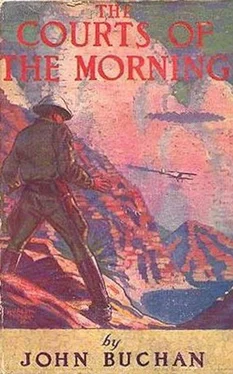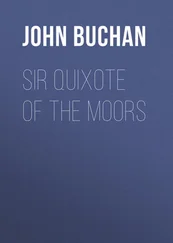John Buchan - The Courts of the Morning
Здесь есть возможность читать онлайн «John Buchan - The Courts of the Morning» — ознакомительный отрывок электронной книги совершенно бесплатно, а после прочтения отрывка купить полную версию. В некоторых случаях можно слушать аудио, скачать через торрент в формате fb2 и присутствует краткое содержание. Жанр: unrecognised, на английском языке. Описание произведения, (предисловие) а так же отзывы посетителей доступны на портале библиотеки ЛибКат.
- Название:The Courts of the Morning
- Автор:
- Жанр:
- Год:неизвестен
- ISBN:нет данных
- Рейтинг книги:3 / 5. Голосов: 1
-
Избранное:Добавить в избранное
- Отзывы:
-
Ваша оценка:
- 60
- 1
- 2
- 3
- 4
- 5
The Courts of the Morning: краткое содержание, описание и аннотация
Предлагаем к чтению аннотацию, описание, краткое содержание или предисловие (зависит от того, что написал сам автор книги «The Courts of the Morning»). Если вы не нашли необходимую информацию о книге — напишите в комментариях, мы постараемся отыскать её.
The Courts of the Morning — читать онлайн ознакомительный отрывок
Ниже представлен текст книги, разбитый по страницам. Система сохранения места последней прочитанной страницы, позволяет с удобством читать онлайн бесплатно книгу «The Courts of the Morning», без необходимости каждый раз заново искать на чём Вы остановились. Поставьте закладку, и сможете в любой момент перейти на страницу, на которой закончили чтение.
Интервал:
Закладка:
Sandy met me at the gates and made me get out of the car and walk the rest of the way with him. In his shocking old tweeds, with his lithe figure, his girlish colouring, and his steady, glowing eyes, he fitted well into that fantastic landscape. You could see that he was glad to have me there, and he made me welcome with all his old warmth, but in the half-mile walk I felt a subtle change in him. His talk didn't bubble over as it used to, and I had a feeling that he was rather making conversation. I wondered if being a peer and a landowner and that sort of thing had sobered him, but I promptly dismissed the idea. I wasn't prepared to believe that external circumstances could have any effect on one who had about as much worldliness as a fakir with his begging-bowl.
All the same there was a change, and I was conscious of it during the evening. Archie Roylance and his young wife were staying there--like me, for the first time. I am prepared to rank Janet Roylance second only to Mary as the prettiest and most delightful thing in the world, and I knew that she and Sandy were close friends. In the daytime she was always, so to speak, booted and spurred, and seemed to have the alertness and vigour of an active boy; but in the evening she used to become the daintiest little porcelain lady; and those who saw Janet as a Dresden shepherdess in a drawing-room would scarcely believe that it was the same person who that morning had been scampering over the heather. She was in tremendous spirits, and Archie is a cheerful soul, but they found it heavy going with Sandy.
We dined in what had been the hall of the thirteenth-century keep--stone walls, a fireplace like a cave, and Jacobean rafters and panelling. Sandy wore the green coat of some Border club, and sat like a solemn sprite in the great chair at the head of his table, while Janet tried to keep the talk going from the other end. The ancient candelabra, which gave a dim religious light, and the long lines of mailed or periwigged Arbuthnots on the wall made the place too heavy a setting for one whom I had always known as a dweller in tents. I felt somehow as if the old Sandy were being shackled and stifled by this feudal magnificence.
The Roylances, having been married in the winter, had postponed their honeymoon, and Janet was full of plans for bringing it off that autumn. She rather fancied the East. Sandy was discouraging. The East, he said, was simply dusty bric-à-brac, for the spirit had gone out of it, and there were no mysteries left, only half-baked Occidentalism. "Go to Samarkand, and you will get the chatter of Bloomsbury intellectuals. I expect in Lhasa they are discussing Freud."
I suggested South Africa, or a trip up through the Lakes to the Nile. Janet vetoed this, because of Archie's stiff leg; she thought big-game hunting would be bad for him, and she considered with justice that if he were in the neighbourhood of wild beasts he would go after them.
Archie himself was inclined to South America. He said he had always had a romance about that part of the world, and he understood that it was the only place which still held some geographical secrets. Also it appeared that, though a poor linguist, he could talk a sort of Spanish, owing to having spent some time in the Madrid Embassy.
"I've never been there," said Sandy, "and I never want to go. It's too big and badly put together, like a child's mud castle. There's cannibal fish, and every kind of noxious insect, and it's the happy home of poisons, and the people are as ugly as sin. The land isn't built according to our human scale, and I have no taste for nightmares."
"All the same, it's tremendously important," Archie replied. "Charles Lamancha says that all the big problems of the future will be concerned with the New World. It might be rather useful to me in politics if I went and had a look round."
Sandy laughed. "Better go to the States. That's the power-house where you press the button."
This gave me the chance to talk about Blenkiron, and I told them what I had heard from Ellery Willis. Archie, who had only seen Blenkiron in the last year of the War, was rather excited; Sandy, who knew him intimately, was apathetic.
"He'll turn up all right. Trust John S. You can't mislay a battered warrior like that. You'd better tell Willis that he is doing a very poor service to Blenkiron by starting a hue-and-cry. The old man won't like it a bit."
"But, I assure you, Willis is very much in earnest. He wanted me to start out right away on a secret expedition, and to quiet him I promised to speak to you."
"Well, you've spoken," said Sandy, "and you can tell him I think it moonshine. Blenkiron will come back to his friends when his job is done, whatever it may be.... Unless Archie likes to take the thing on?"
He seemed to want to drop the subject, but Janet broke in:
"I always understood that Mr Blenkiron had no relations except the nephew who was killed in the War. But I met a girl last month who was a niece or a cousin of his. She told me she had been staying in the Borders and had been taken to see you at Laverlaw."
Sandy looked up, and I could have sworn that a shade of anxiety passed over his face.
"Her name was Dasent," Janet went on. "I can't remember her Christian name."
"Probably Irene--pronounced Ireen," said Sandy. "I remember her. She came over with the Manorwaters. She seemed to have got a little mixed about Scotland, for she wanted to know why I wasn't wearing a kilt, and I told her 'because I was neither a Highlander nor a Cockney stockbroker.'"
He spoke sharply, as if the visit had left an unpleasant memory.
"I should like to meet a niece of Blenkiron's," I said. "Tell me more about her."
In reply Sandy made a few comments on American young women which were not flattering. I could see what had happened--Sandy at a loose end and a little choked by his new life, and a brisk and ignorant lady who wanted to enthuse about it. They had met 'head on,' as Americans say.
"You didn't like her?" I asked.
"I didn't think enough about her to dislike her. Ask Janet."
"I only saw her for about an hour," said that lady. "She came to stay with Junius and Agatha at Strathlarrig just when I was leaving. I think I rather liked her. She was from South Carolina, and had a nice, soft, slurring voice. So far as I remember she talked very little. She looked delicious, too--tallish and slim and rather dark, with deep eyes that said all sorts of wonderful things. You must be as blind as a bat, Sandy, if you didn't see that."
"I am. I don't boast of it--indeed I'm rather ashamed of it--but I'm horribly unsusceptible. Once--long ago--when I was at Oxford, I was staying in the West Highlands, and in the evening we sat in a room which looked over the sea into the sunset, and a girl sang old songs. I don't remember whether she was pretty or not--I don't remember her name--but I remember that her singing made me want to fall in love.... Since I grew up I've had no time."
Janet was shocked. "But, Sandy dear, you must marry."
He shook his head. "Never! I should make a rotten husband. Besides, Dick and Archie have carried off the only two women I love."
After that he seemed to cheer up. I remember that he took to telling stories of poisons--I suppose the mention of South America set him off on that. He showed us a box with three tiny pellets in it, things which looked like discoloured pearls, and which he said were the most mysterious narcotics in the world, and one of the deadliest poisons. They reminded me of pills I once got from an old Portugee prospector, which I carried about with me for years but never touched, pills to be used if you were lost in the bush, for one was said to put you into a forty-hours sleep and two gave a painless death. Sandy would explain nothing further about them, and locked them away.
Читать дальшеИнтервал:
Закладка:
Похожие книги на «The Courts of the Morning»
Представляем Вашему вниманию похожие книги на «The Courts of the Morning» списком для выбора. Мы отобрали схожую по названию и смыслу литературу в надежде предоставить читателям больше вариантов отыскать новые, интересные, ещё непрочитанные произведения.
Обсуждение, отзывы о книге «The Courts of the Morning» и просто собственные мнения читателей. Оставьте ваши комментарии, напишите, что Вы думаете о произведении, его смысле или главных героях. Укажите что конкретно понравилось, а что нет, и почему Вы так считаете.












